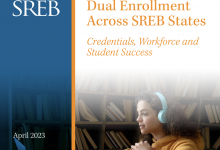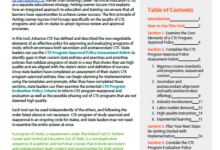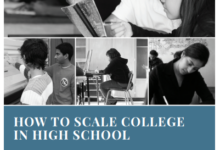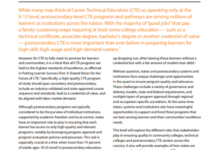The Florida College System (FCS) and State Board of Education (SBOE) work together to ease the burden of program approval processes by designing and validating curriculum frameworks at the state level. These frameworks involve input from numerous industry partners and content experts and list key standards and benchmarks that programs must meet. While the courses can vary across the system, they must all be able to demonstrate how they deliver the standards and benchmarks and meet other framework requirements.
Once a curriculum framework has been approved by the SBOE, other FCS institutions may apply the framework to new programs and are not required to undergo an approval process. Most FCS institutions start programs by using an existing framework, allowing them to start their program more quickly and avoid a lengthy approval process. Per state statute, the Department of Education is responsible for conducting program reviews every three years to ensure that the programs are providing high-quality and relevant content and are producing good outcomes for learners.
The SBOE also works with and encourages the 28 FCS institutions and the state’s 49 school district career centers to develop articulation and transfer agreements to provide seamless transitions for Florida learners. All postsecondary institutions also share common course codes, which allows the transfer and articulation process to be even more straightforward for both learners and institutions. FCS institutions and school district technical centers create articulation agreements that allow clock-hour credit programs to be articulated into relevant college credits. Many FCS institutions have agreements with their local school district career centers to allow learners to build on skills gained at the career centers and use the credit earned toward an associate degree. FCS institutions also have articulation agreements with four-year colleges and universities so that a learner could start his or her education at a school district career center, transfer to an FCS institution, and then transfer to a four-year college or university, all on a clearly articulated path. Similarly, community colleges have articulation agreements with four-year colleges so that a learner could start his or her education at a postsecondary career center, transfer to a community college, and then transfer to a four-year college, all on a clearly articulated path. All postsecondary institutions also share common course codes, which allows the process to be even more straightforward for both learners and institutions.
Policy in Action
The state is able to achieve this delegation because it is one of 15 states and territories to have postsecondary-level statewide CTE standards. Florida delivers CTE programs and courses through three different systems — secondary, postsecondary/adult vocational and postsecondary degree/certificate programs. The state maintains a separate set of industry-driven CTE standards (i.e., curriculum frameworks) for each of its delivery systems; however, the three sets of CTE standards are developed concurrently by the same committee of business/industry, secondary and postsecondary representatives.
Related Links
Curriculum Framework:Florida’s Current Frameworks
Resource: Resources on Articulation in Florida
Resource: AS to BS Career Ladder Articulation Agreements
Statute: Statewide Articulation Agreements (2+2)
Report: The State of Career Technical Education: An Analysis of State CTE Standards
Last updated: August 2021






